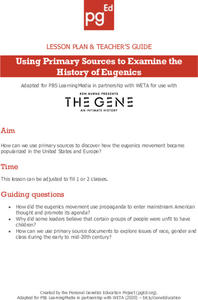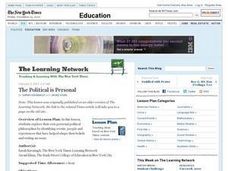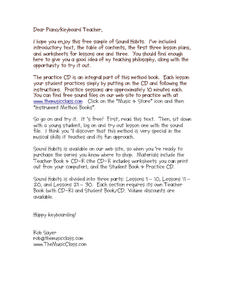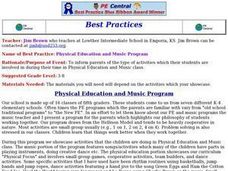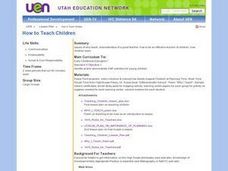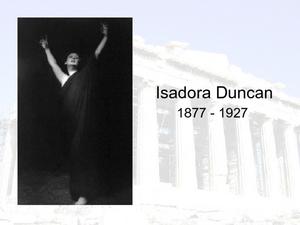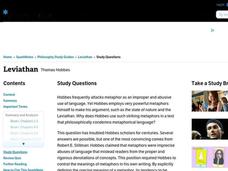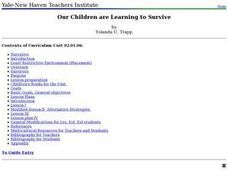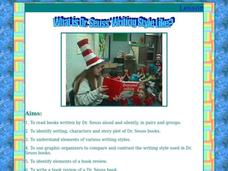Curated OER
Children's Philosophy
Using children's books is an excellent way to introduce your students to the world of philosophy.
Advocates for Human Rights
The Rights of the Child
Don't be fooled by the size of the resource: these few pages provide the blueprint for a substantial, thoughtful unit on children's rights and the different philosophies and approaches that the United States and other countries have...
PBS
Making Change: Revolutionary Tactics of the Civil Rights Movement
The film American Revolutionary: The Evolution of Grace Lee Boggs introduces viewers to the differing philosophies of and strategies employed by 1960s civil rights leaders such as Malcolm X and Martin Luther King, Jr. and the debate over...
Curated OER
Children of War
Pupils discuss children's rights during wartime and watch public service announcements. After reading excerpts from children's diaries of war, they work in groups to create a storyboard for their own PSA on children's rights during...
Julie Negrin
How to Teach Cooking to Kids
Youngsters are more likely to eat something if they've worked hard to make it! Plan a cooking class with an e-booklet from Julie Negrin, author of Easy Meals to Cook With Kids. It includes what you should consider about your...
Personal Genetics Education Project
Using Primary Sources to Examine the History of Eugenics
Eugenics philosophy takes survival of the fittest to a whole new level. With a research-focused lesson, young scientists examine the history of the eugenics movement and its impact on society. Pupils engage with a video clip, primary...
Curated OER
Fear and Trembling
In this online interactive philosophy worksheet, students respond to 10 short answer and essay questions about Kierkegaard's Fear and Trembling. Students may check some of their answers on the interactive worksheet.
Curated OER
The Grimm Truth—Comparing & Contrasting Children’s Stories and Fairy Tales in Cross-Cultural Texts at Different Points in Time
Students explore world literature through completing several varied exercises. In this compare and contrast instructional activity students compare and contrast stories and how time and culture impacts the stories.
Curated OER
The Political is Personal
Students examine their own political party affiliations and political beliefs. After reading an article, they discuss how students at Duke define their political philosophies. They brainstorm events, people and experiences that have...
Curated OER
Continuing Gandhi's Legacy of Cross-Cultural Understanding: Central Asia and the Middle East
Students investigate the lifestyle of Gandhi by creating a Venn Diagram. In this biographical instructional activity, students compare the philosophies of Martin Luther King Jr. and Gandhi while discussing their teaching methods....
Music Class
Sound Habits
Hear ye! Hear ye! Encourage your young keyboard/piano players to develop sound habits with a resource packet that introduces a dynamic learning method. The free sample lessons, part of a for-purchase program, are designed to be used in a...
Curated OER
Physical Education and Music Program
Teach everyone how to work together in both physical education and music activities. Parents and their children are shown a presentation that highlights the philosophy of cooperation. They apply these concepts to their physical education...
Curated OER
Social Studies: How to Teach Children
Students examine reasons for teaching children and the characteristics of an effective teacher. After a Powerpoint presentation which includes a humorous look at the 1915 rules for teachers, they create daily teaching schedules and...
Curated OER
Children in the United States and Japan
Pupils locate Japan on a map or globe and describe the relative location of Japan. They use the Internet to investigate cultural characteristics of children in the United States and in Japan. They use a Venn Diagram as an organizational...
Curated OER
Introduction to Community Helpers
Students discover philosophy by viewing a PowerPoint presentation. For this community helper lesson, students identify the jobs and careers around the city which help to benefit residents and children who live in the area. Students view...
Curated OER
Isadore Duncan
Who is Isadore Duncan? If you're a teacher of dance, you might be interested in this informative presentation. Biographical, philosophical, and personal information on the life and contributions of this famed dancer are given in an easy...
Curated OER
“Self Reliance” Questions
Is consistency foolish? Or is “foolish consistency . . . the hobgoblin of little minds”? Ralph Waldo Emerson’s “Self Reliance” provides readers with an opportunity to reflect on their own musing about being self-reliant and about...
Curated OER
Laches
In this online interactive history learning exercise, students respond to 10 short answer and essay questions about Plato's Laches. Students may check some of their answers on the interactive learning exercise.
Curated OER
Leviathan
In this online interactive history activity, students respond to 10 short answer and essay questions about Leviathan by Hobbes. Students may check some of their answers on the interactive activity.
Curated OER
Our Children are Learning to Survive
Students examine the various cultures of the world through literature. After reading various stories, they compare their own personal experience with the characters. In groups, they take the original story and add their own characters...
Curated OER
Ahimsa in the Real World: Truth, Love, and Nonviolence
Second graders create an abstract painting that conveys feelings of nonviolence. In this visual arts instructional activity, 2nd graders read "The First Step of Jainism" and discuss honesty, watch a digital story, discuss feelings...
Curated OER
A Read-In
Students explore philosophy by participating in a philanthropic activity. In this book read-in lesson, students collect a group of used books and illustrate an image to go along with the story. Students donate these books to a shelter or...
Curated OER
Designing a Civilization for an Art Room
Students discover the ideas of civilizations by researching Gandhi's philosophies. In this art decoration lesson, students investigate Gandhi's opinions on civilizations, community and ethics. Students collaborate by...
Curated OER
Dr. Seuss
Students read books by the same author and compare what they find. In this Dr. Seuss lesson, students learn about Dr. Seuss' writing style, listen for the rhyme scheme in his stories, and create a KWL chart on Dr. Seuss. ...







